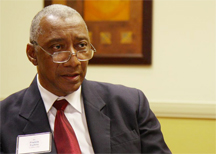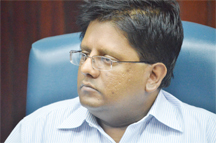Guyana’s potential to become the region’s financial success story is being threatened by the scourge of corruption, says Francis Forbes, Interim Executive Director of the Caricom security agency, IMPACS.
Forbes’ frank presentation yesterday at the opening session of day two of a two-day Guyana Investment Conference triggered an immediate response from Finance Minister Ashni Singh, who chastised organisers for focussing too much on corruption and not addressing matters such as the cost of energy and bandwidth.
Speaking at the Guyana International Conference Centre, Forbes said plainly, “The truth is that there are some persons who see the issue of corruption in Guyana as endemic.”

Forbes, a former Commissioner of Police in Jamaica, spoke of the economic costs to a country visited by corruption. “There is of course an economic cost to corruption…bribery impedes long term foreign and domestic investment. It pushes firms underground and outside of the formal sector,” he said. He added that bribery undercuts the State’s ability to raise revenue and will cause higher tax rates to be levied on fewer and fewer taxpayers.
Forbes, whose Implementation Agency for Crime and Security (IMPACS) had ironically been caught in an embarrassing money scandal in 2011, leading to the dismissal of its head, said that corruption will impede the State’s ability to provide essential public goods including the rule of law. “A vicious cycle of corruption and underground economic activity could result”, he warned.
He said that if current threats continue the future effectiveness of law enforcement and unprejudiced public sector administration and the integrity of the Judiciary will be threatened. “There is already significant evidence of these institutions being undermined. Government officials including politicians in past and recent times have also come (on) the radar for their involvement in drug trafficking syndicates, gang related activities, fraud schemes and white collar crimes.
He said that unscrupulous law enforcement officials often compromise law enforcement efforts by giving out key information to criminal organisations “and even supplying them with service gear and ammunition.”

Turning to money laundering, he said that money laundering syndicates are known to be using off shore crimes for trading in bond merchandising, questionable remittances and investments in real estate and purchase of luxury goods and promotion of social events. He said that they could be linked also to arms trafficking, human trafficking and terrorism.
‘Politicised’
Minister Singh rose immediately after and defended government’s efforts at fighting corruption and urged persons not to get the wrong picture of the country by paying attention to what is said during the political wars of words between parties.
Singh said political parties are always competing for political space in the competitive political landscape here. “Issues are politicised and made into material for political contests, including indeed the issue of corruption. I hear Mr. Forbes speak of the scourge of corruption and I would urge some caution in perpetuating at a rigorous level [such statements],” he said.
“I expect this exchange. It is natural in a competitive political environment but coming from a regional or international agency, I would urge some caution in perpetuating that which is gleaned or extracted from the political contest,” said Singh.
He said that while there are government reports about improprieties in government departments in the United States and in the UK, these are diluted because of those environments being so large. He said that this is not so in Guyana and such reports will make fodder for the next screaming headline in the local dailies.
“Not because this happens in the US or in the UK or in Canada does it make it acceptable… we have an obligation as a government to have strong institutional structures in place, to illuminate opportunities for mismanagement, corruption, waste and fraud,” he said. “We have the responsibility as a government to ensure that such structures are in place and we will not shirk that responsibility,” he said.
“I agree…we need to have strong systems in place to improve efficiency and effectiveness in Government and eliminate all of these things. Every step that we make in this regard will indeed improve the investment environment,” he added.
‘Impediments’
He criticised the organisers of the conference for leaving out sessions on the cost of energy and the cost of bandwidth.
“The cost of energy today in Guyana is acknowledged by the Private Sector as prohibitively high and I say with absolutely no fear of contradiction that any investor in Guyana will say to you that the cost of energy is a major impediment to their entry and expansion in Guyana,” he said.
“I have perused the programme and I don’t see energy addressed anywhere. I don’t dismiss crime and security but I see two speaking slots for Mr. Forbes, but I don’t see a single speaking slot for anybody on the matter of energy,” he said.
“I would urge High Commissioner that when you do the second round of this conference that you cast the net a little bit more widely. Because speaking to businesses as I do, I would say that we have to confront the reality that energy is prohibitively expensive,” he said.
The Minister said that were one to speak to the fastest growing sector in Guyana – the business processing outsourcing sector – one would hear the complaint that the cost of internet bandwidth is too high.
He said that an American firm did a study on this sector in Guyana and concluded that the cost of bandwidth as the single most important impediment to entry into this market. “They said that Guyana is as competitive as other places except for the cost of bandwidth,” he said. He said that were the cost of bandwidth comparable to those of other countries then thousands of jobs could be created.
“Again I have perused the programme and [see nothing addressing the cost of bandwidth,” he said. “This is the sector that is populated by the single largest private employer in Guyana, the single international investor which has created the most jobs in Guyana,” he said.
“They created 2,000 jobs in a few years…they must have had a reason for coming to Guyana,” he said. This appeared to be a reference to Mexican call centre company Qualfon.
“We as a country have made tremendous efforts to improve the business environment…to put in place legislative and institutional environment conducive to macro-economic growth, profitability and job creation,” he said. “I believe if we are to be objective and fair we have made considerable progress in this regard,” Singh said.
Observers point out that the cost of energy and bandwidth is mainly in the purview of the government. Critics have said that in the last 20 years the government has done very little at finding cheaper sources of energy or lowering costs by significantly cutting commercial and line losses at the power company.
In relation to bandwidth, the government controls licensing and the spectrum. It was noted that it has invested in a fibre optic cable which is intended for public sector use and may not have an impact on bandwidth cost. High bandwidth costs has been frequently cited by the private sector here.
Speaking immediately after the Minister, Canadian High Commissioner to Guyana David Devine said,
“I don’t think that there is anyone in this room who wishes to exaggerate this situation. We agree I think that everyone here [knows] that we have to have strong structures in place.”
Defending the conference agenda, Devine said that the purpose of the conference was to enhance those structures
“We did share the programme rather broadly, including to quite a number of ministries in the government, the private sector, the Chamber of Commerce and other groups and we tried to structure it in a way that provided balance and tried to get at some of the main issues,” said Devine.








